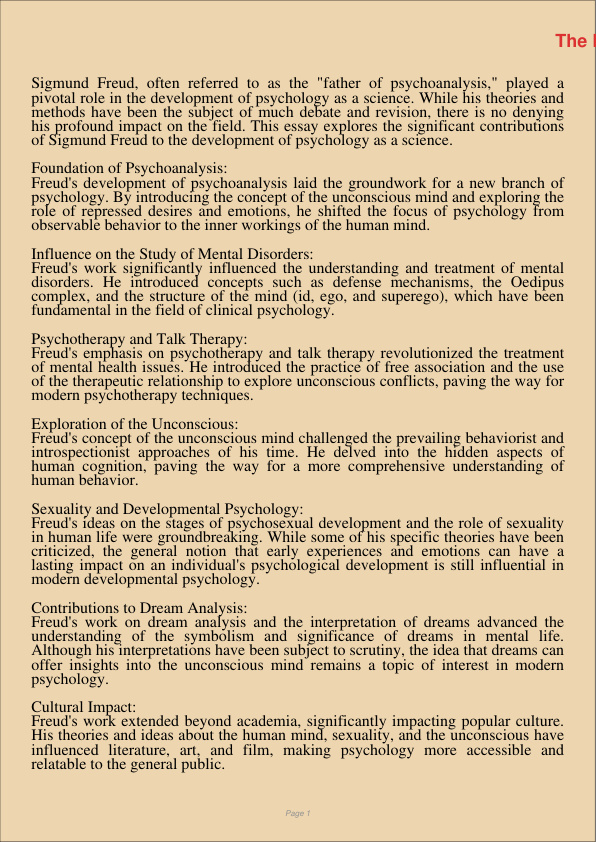The Role Of Sigmund Freud In The Development Of Psychology As A Science
Jan 9, 2024
sigmund freud
science
Religion and Theology
Visual Arts & Film Studies

Sigmund Freud, often referred to as the “father of psychoanalysis,” played a pivotal role in the development of psychology as a science. While his theories and methods have been the subject of much debate and revision, there is no denying his profound impact on the field. This essay explores the significant contributions of Sigmund Freud to the development of psychology as a science.
Foundation of Psychoanalysis: Freud’s development of psychoanalysis laid the groundwork for a new branch of psychology. By introducing the concept of the unconscious mind and exploring the role of repressed desires and emotions, he shifted the focus of psychology from observable behavior to the inner workings of the human mind.
Influence on the Study of Mental Disorders: Freud’s work significantly influenced the understanding and treatment of mental disorders. He introduced concepts such as defense mechanisms, the Oedipus complex, and the structure of the mind (id, ego, and superego), which have been fundamental in the field of clinical psychology.
Psychotherapy and Talk Therapy: Freud’s emphasis on psychotherapy and talk therapy revolutionized the treatment of mental health issues. He introduced the practice of free association and the use of the therapeutic relationship to explore unconscious conflicts, paving the way for modern psychotherapy techniques.
Exploration of the Unconscious: Freud’s concept of the unconscious mind challenged the prevailing behaviorist and introspectionist approaches of his time. He delved into the hidden aspects of human cognition, paving the way for a more comprehensive understanding of human behavior.
Sexuality and Developmental Psychology: Freud’s ideas on the stages of psychosexual development and the role of sexuality in human life were groundbreaking. While some of his specific theories have been criticized, the general notion that early experiences and emotions can have a lasting impact on an individual’s psychological development is still influential in modern developmental psychology.
Contributions to Dream Analysis: Freud’s work on dream analysis and the interpretation of dreams advanced the understanding of the symbolism and significance of dreams in mental life. Although his interpretations have been subject to scrutiny, the idea that dreams can offer insights into the unconscious mind remains a topic of interest in modern psychology.
Cultural Impact: Freud’s work extended beyond academia, significantly impacting popular culture. His theories and ideas about the human mind, sexuality, and the unconscious have influenced literature, art, and film, making psychology more accessible and relatable to the general public.
Continual Evolution and Critique: While many of Freud’s specific theories have been revised or discarded, his willingness to adapt and refine his ideas reflects the scientific nature of psychology. Freud’s work prompted a critical and analytical approach to psychology, fostering a culture of ongoing research and development in the field.
In conclusion, Sigmund Freud’s contributions to the field of psychology were instrumental in its evolution as a science. His work laid the foundation for the study of the unconscious mind, psychotherapy, and the understanding of human behavior and development. While his specific theories have been subject to critique and revision, his legacy as a pioneer in the realm of psychological science remains undisputed. Freud’s impact continues to resonate within the field of psychology and the broader understanding of the human mind.